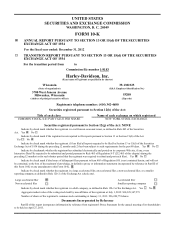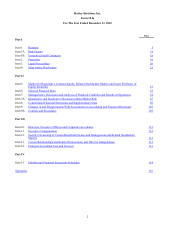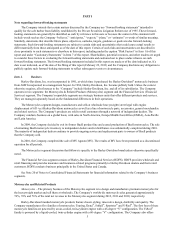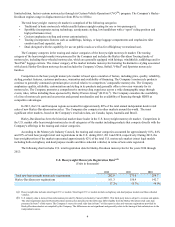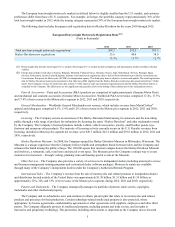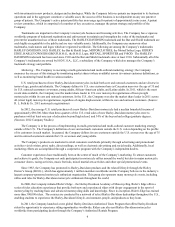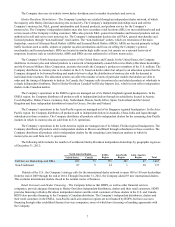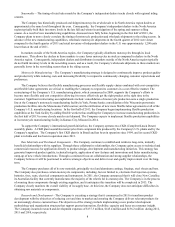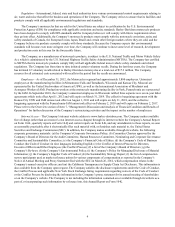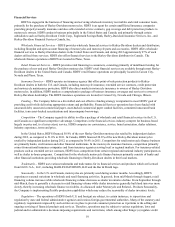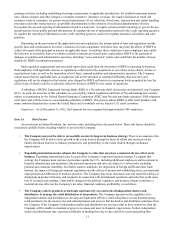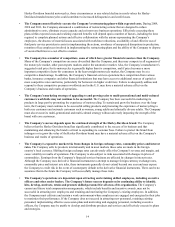Harley Davidson 2012 Annual Report Download - page 5
Download and view the complete annual report
Please find page 5 of the 2012 Harley Davidson annual report below. You can navigate through the pages in the report by either clicking on the pages listed below, or by using the keyword search tool below to find specific information within the annual report.
5
The European heavyweight motorcycle market (as defined below) is slightly smaller than the U.S. market; and customer
preferences differ from those of U.S. customers. For example, in Europe, the sportbike category represented nearly 36% of the
total heavyweight market in 2012 while the touring category represented 39% of the European heavyweight motorcycle market.
The following chart includes European retail registration data for Harley-Davidson for the years 2010 through 2012:
European Heavyweight Motorcycle Registration Data(a)(b)
(Units in thousands)
2012 2011 2010
Total new heavyweight motorcycle registrations 268.3 292.5 301.3
Harley-Davidson new registrations 35.6 40.0 38.0
13.3% 13.7% 12.7%
(a) Heavyweight data includes street legal 651+cc models. Street legal 651+cc models include on-highway and dual purpose models and three-wheeled
vehicles.
(b) Europe data includes retail sales in Austria, Belgium, Denmark, Finland, France, Germany, Greece, Italy, Netherlands, Norway, Portugal, Spain,
Sweden, Switzerland, and the United Kingdom. Industry retail motorcycle registration data is derived from information provided by Association des
Constructeurs Europeens de Motocycles (ACEM), an independent agency. This third party data is subject to revision and update. The retail registration
data for Harley-Davidson motorcycles presented in this table may differ slightly from the Harley-Davidson retail sales data presented in Item 7 of this
report. The Company’s source for retail sales data in Item 7 of this report is sales and warranty registrations provided by Harley-Davidson dealers as
compiled by the Company. The differences are not significant and generally relate to the timing of data submissions to the independent sources.
Parts & Accessories – Parts and Accessories (P&A) products are comprised of replacement parts (Genuine Motor Parts)
and mechanical and cosmetic accessories (Genuine Motor Accessories). Worldwide P&A net revenue comprised 17.4%, 17.5%
and 17.9% of net revenue in the Motorcycles segment in 2012, 2011 and 2010, respectively.
General Merchandise – Worldwide General Merchandise net revenue, which includes revenue from MotorClothes®
apparel and riding gear, comprised 6.1%, 5.9% and 6.2% of net revenue in the Motorcycles segment in 2012, 2011 and 2010,
respectively.
Licensing – The Company creates an awareness of the Harley-Davidson brand among its customers and the non-riding
public through a wide range of products for enthusiasts by licensing the name “Harley-Davidson” and other trademarks owned
by the Company. The Company’s licensed products include t-shirts, vehicle accessories, jewelry, small leather goods, toys,
footwear and numerous other products. The majority of licensing activity currently occurs in the U.S. Royalty revenues from
licensing, included in Motorcycles segment net revenue, were $49.1 million, $43.2 million and $39.8 million in 2012, 2011 and
2010, respectively.
Harley-Davidson Museum – In 2008, the Company opened the Harley-Davidson Museum in Milwaukee, Wisconsin. The
Museum is a unique experience that the Company believes builds and strengthens bonds between riders and the Company and
enhances the brand among the public at large. The 130,000 square foot museum campus houses the Harley-Davidson Museum
and Archives, a restaurant, café, retail store and special event space. The Museum gives the Company a unique way to create
memories for customers – through visiting, planning rides and hosting special events at the Museum.
Other Services – The Company also provides a variety of services to its independent dealers including motorcycle service
and business management training programs and customized dealer software packages. Motorcycle rentals are available
through many of the Company’s independent dealers under the Company’s Authorized Rentals Program.
International Sales – The Company’s revenue from the sale of motorcycles and related products to independent dealers
and distributors located outside of the United States was approximately $1.58 billion, $1.51 billion and $1.36 billion, or
approximately 32%, 32% and 33% of net revenue of the Motorcycles segment, during 2012, 2011 and 2010, respectively.
Patents and Trademarks – The Company strategically manages its portfolio of patents, trade secrets, copyrights,
trademarks and other intellectual property.
The Company and its subsidiaries own, and continue to obtain, patent rights that relate to its motorcycles and related
products and processes for their production. Certain technology-related intellectual property is also protected, where
appropriate, by license agreements, confidentiality agreements or other agreements with suppliers, employees and other third
parties. The Company diligently protects its intellectual property, including patents and trade secrets, and its rights to
innovative and proprietary technology. This protection, including enforcement, is important as the Company moves forward

